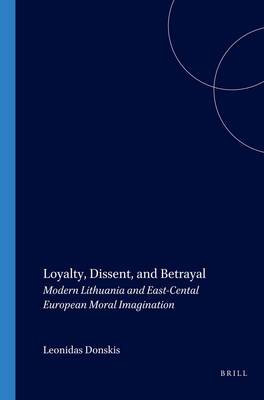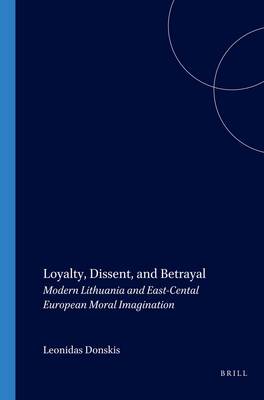
- Afhalen na 1 uur in een winkel met voorraad
- Gratis thuislevering in België vanaf € 30
- Ruim aanbod met 7 miljoen producten
- Afhalen na 1 uur in een winkel met voorraad
- Gratis thuislevering in België vanaf € 30
- Ruim aanbod met 7 miljoen producten
Zoeken
Loyalty, Dissent, and Betrayal
Modern Lithuania and East-Central European Moral Imagination
Leonidas Donskis
€ 100,95
+ 100 punten
Omschrijving
Loyalty and betrayal are among key concepts of the ethic of nationalism. Marriage of state and culture, which seems the essence of the congruence between political power structure and collective identity, usually offers a simple explanation of loyalty and dissent. Loyalty is seen as once-and-for-all commitment of the individual to his or her nation, whereas betrayal is identified as a failure to commit him or herself to a common cause or as a diversion from the object of political loyalty and cultural/linguistic fidelity. For conservative or radical nationalists, even social and cultural critique of one's people and state can be regarded as treason, whereas for their liberal counterparts it is precisely what constitutes political awareness, civic virtue, and a conscious dedication to the people and culture.
"This book is the first attempt to provide a discursive map of Lithuanian liberal and conservative nationalism. Analyzing the works and views of dissenters and critics of society and culture, we can reveal a mode of being of liberal nationalism as a social and cultural criticism. This volume is of interest for intellectual historians, social theorists, students of East-Central European thought, and anyone interested in Baltic studies and the new members of the EU. Dissent: act of betrayal, or loyalty? Leonidas Donskis' new remarkable study is one consistent, thorough and dedicated effort to provide an answer to that question." - Zygmunt Bauman (from the Preface)
"This book is the first attempt to provide a discursive map of Lithuanian liberal and conservative nationalism. Analyzing the works and views of dissenters and critics of society and culture, we can reveal a mode of being of liberal nationalism as a social and cultural criticism. This volume is of interest for intellectual historians, social theorists, students of East-Central European thought, and anyone interested in Baltic studies and the new members of the EU. Dissent: act of betrayal, or loyalty? Leonidas Donskis' new remarkable study is one consistent, thorough and dedicated effort to provide an answer to that question." - Zygmunt Bauman (from the Preface)
Specificaties
Betrokkenen
- Auteur(s):
- Uitgeverij:
Inhoud
- Aantal bladzijden:
- 180
- Taal:
- Engels
- Reeks:
- Reeksnummer:
- nr. 4
Eigenschappen
- Productcode (EAN):
- 9789042017276
- Verschijningsdatum:
- 1/01/2005
- Uitvoering:
- Paperback
- Formaat:
- Trade paperback (VS)
- Afmetingen:
- 150 mm x 220 mm
- Gewicht:
- 317 g

Alleen bij Standaard Boekhandel
+ 100 punten op je klantenkaart van Standaard Boekhandel
Beoordelingen
We publiceren alleen reviews die voldoen aan de voorwaarden voor reviews. Bekijk onze voorwaarden voor reviews.








